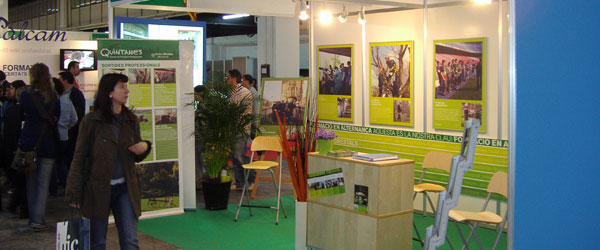
+ info: http://www.ensenyament.com/
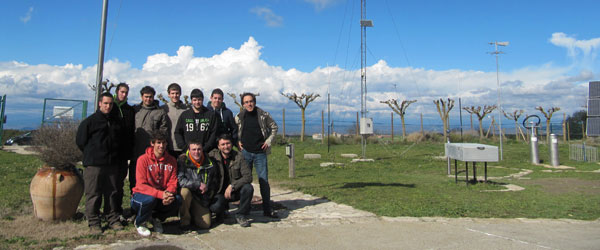
On the 12th March the first year students of the higher-level Pig Breeding management and organisation course visited the Pujalt observatory where they did different activities on a tour guided by the meteorologist Albert Borras. We studied different types of meteorological equipment, visited parts of the facility, and learnt about the relationship with agriculture and the aspects involved in weather prediction. We also looked at how to make a climate study and carried out experiments in order to understand meteorological processes better. A great, fun day all thanks to Mr Borras.
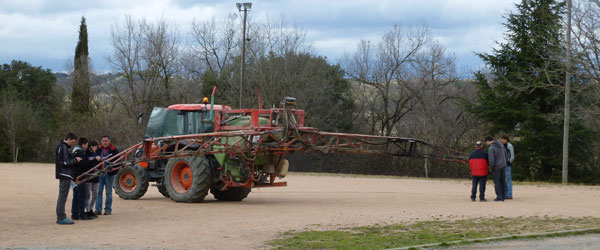
On Tuesday 12th March the higher level Pig Breeding management and organisation course students practised the calibration process on a phytosanitary (pesticide spraying) machine. What's more, the students could evaluate the different elements involved in a technical inspection and they also measured dust quality with ultra-sensitive paper. We would like to thank Mr Joan Solà for his help and the use of his machine.
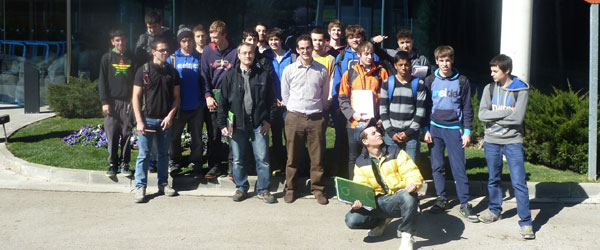
+ info: http://www.regaber.com/
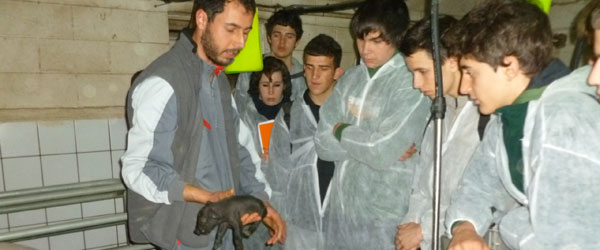
This week we have taken the first year medium-level Pig Breeding and Production course students to Artiga Farm, owned by the Boada-Porcel company. It is a 250 sow, closed cycle farm located in Seva. The visit gave students the chance to brush up on the subjects tackled in the pig production study plan.
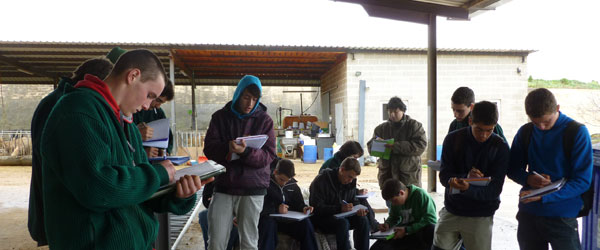
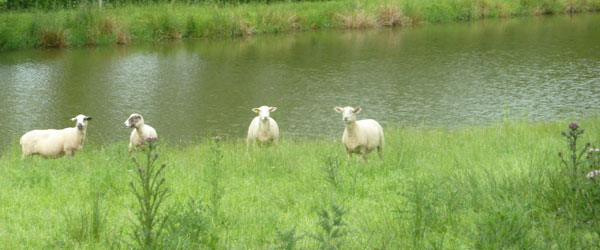
On the next technical day on the 13th March we will deal with feeding, reproduction and handling themes, while still focusing on the prime objectives; reducing costs and maximising profits in a rational and practical way. The day will be led by the qualified vet, Mr Ramon Bach, and will last from 09.00 to 18.00. The day is open to all members of the public, the inscription process to attend concludes on the 11th March. Please call 938502441.
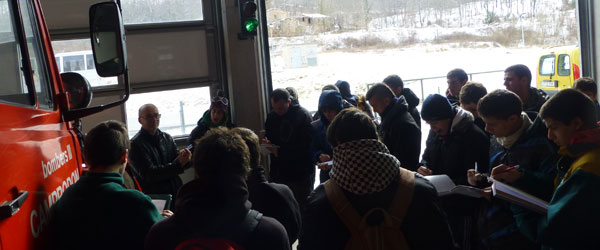
Last Thursday, 28th February, the first-year forestry and environmental conservation student group visited the Camprodon voluntary firemen park. On the visit Mr Francesc Carola, park-head, explained how the site functioned. We were able to see first-hand the equipment on board a fire engine and the latest facilities at the park. We also learnt what really pushes someone to give up their free time to voluntary work. Outings like this not only motivate our students professionally but can also stir that feeling of solidarity that we all harbour within us.
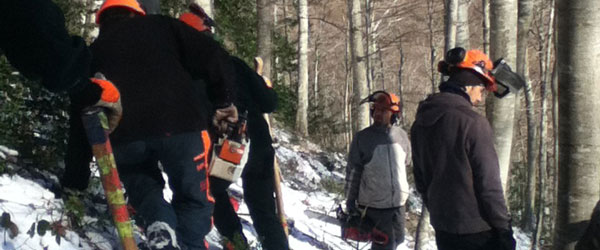
The week which included the days from the 25th to 28th February proved to be the coldest of the winter so far. The students from the above course went on an outing to cut beech trees at Vidrà. On the way to the site the school van's thermometer marked minus 8 Celsius, while snow fell as we worked on the trees - conditions to be compared to those experienced by a work gang on a gulag in Siberia. Despite this all the team did their best to keep warm and carried on with the work, cutting in a selective process to leave the forest in optimum conditions. Some specimens were up to 45 to 50 cm in diameter! All in all, we enjoyed the experience; learning that advice, sacrifice, effort.
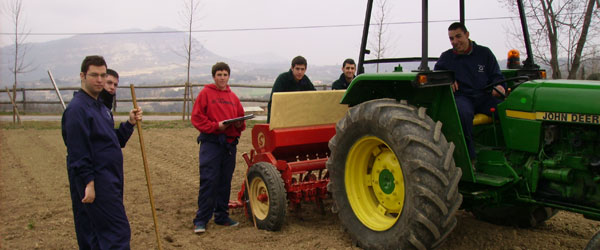
On the 21st February we did some sowing on a part of experimental land. The students from the second-year medium level pig farm production course carried out the sowing process with three varieties of barley; Graphic, Gustav and Gaelic, using different doses too. This was after having studied sowing types, the practical side of the process and its regulations in class. The doses used were; 117 kilos/Ha, 170 kilos/Ha and 230 kilos/Ha. Using these quantities it will be possible to see the harvest results with small, medium and large amounts of seeds. Now it just has to rain and we'll wait to see the results.
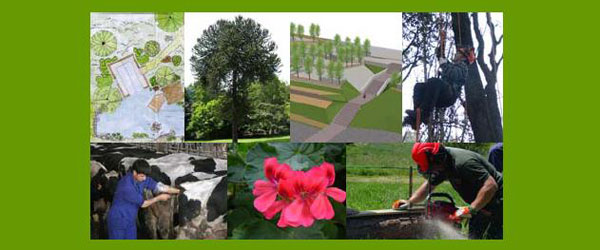
We would like to introduce to you this year's technical courses within the forestry, gardening and farming sector for people connected to these fields, whether it is in an amateur or professional capacity.
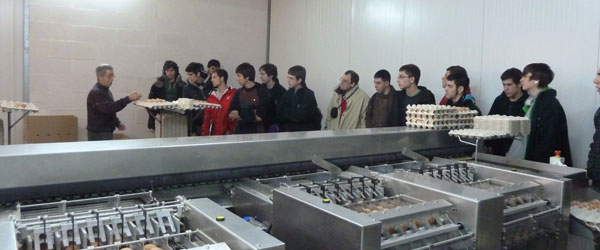
On Tuesday, 19th February, we visited the Oliveres farm, a hen-egg production farm adapted to
cater for animal welfare. The farm was located in Fals, in the Bages county, and produces four million eggs a year for consumption, selling directly to the public. Our students from the second year medium level course group had the chance to see, and learn at first hand, all about the farm's new style enclosures. This was all thanks to the kindness of the owner and father of an ex-Quintanes student, Joan Clotet.
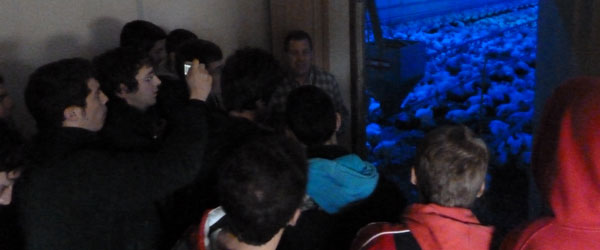
Mas Miralles is a chick-rearing production farm found in Rajadell. The visit was guided by Josep Maria Puig, the farm owner, who led the second-year medium level students around the two enclosures, with thirty thousand chicks in each. Both are equipped with the latest technology to guarantee the welfare and well-being of the animals. It should be said that the visit was benefited by the fact that the owners belong to the immense Quintanes family group.
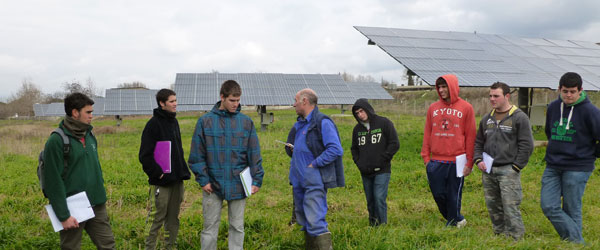
On the 19th February the first-year higher level pig farming management and organisation course students visited the ´Caseta d'en Grau` farm in the Calldetenes area. The farm head, Mr Pere Colom, explained the different sides of the company; those involving crop growing, cows, pig production, animal feed production, its facilities for manure treatment and other ongoing projects, like the one related to solar panel produced electricity and another concerning the commercialisation of the farm's produce.
Thanks to this visit, our students were able to see at first hand the day-to-day running of the business, the results of many years of dedication to various projects and the vision needed to continue developing and working in new areas.
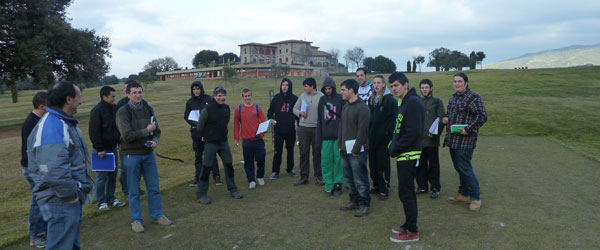
After visiting the Camp Nou in the morning, we went on to the Muntanyà golf club in Seva after lunch. The club's green keeper told us all about the different lawn maintenance tasks used at a golf course. On the visit the students studied the different parts of a golf course, the measurements of the lawn hoeing process, the various types of grass species, grass infections, watering systems, as well as a detailed explanation of the machinery used and its characteristics.
These visits enabled the students to compare facilities where grass plays a vital role in their use, but where different technics and problem-solving processes are applied.
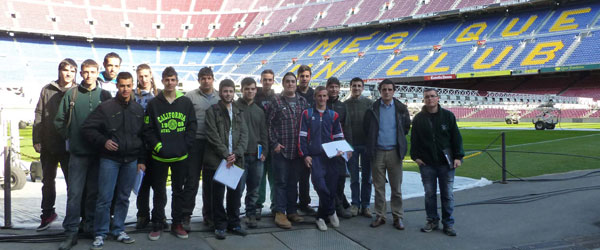
One of the areas we pay particular attention to on the second-year medium level gardening course is that of grass and lawn maintenance. On the 14th of January the students from this course went on a study visit to the Camp Nou stadium. A technician from the Royal Verd company, responsible for the up-keep of the stadium's grass, gave us a detailed explanation on the maintenance process, including information about watering, fertilisation, infections and technics used to ensure that the grass is in perfect condition. We also learned about how the renovation of the grass areas is undertaken and how they organise the work-force responsible for their up-keep. In addition, we saw the machinery that is used by the company and learned how to look after it. Of particular interest were the watering facilities used at the stadium.
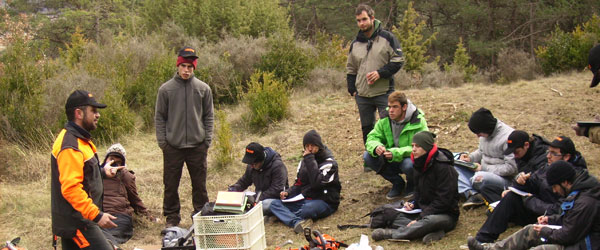
On Friday, 8th February, a theoretical/practical training day was held by the Honda Green company from La Garriga. It dealt with the economic management of forestry and gardening equipment.
Mr Pere Cañizares and Mr Pedro Sillero gave a theory session on managing and improving the economic results of any company dealing with forestry or gardening machinery. This was followed by a practical class in a nearby forest on how to cut vegetation in a safe way, as well as how to look after and maintain a chainsaw. At the end of the day participants could do cutting practise with manual saws made by the Silky brand.
This training day was intended for the second year higher-level forestry and environmental management course students of Quintanes. We would like to thank everyone involved in the day for aiding our students' development.
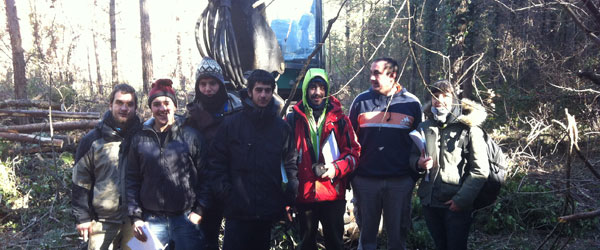
On this visit the second-year, higher level natural resources and landscape management students worked to clear animal-filled Pinassa (Pinus Nigra) forests to improve their overall condition. Afterwards, we visited the Sant Feliu Sasserra area, affected by forest fires in the summer of 2012. There we did cutting work with chainsaws, as well as clearing using a tractor and capstan. We then went on to another area affected by the same fires where we did similar work.
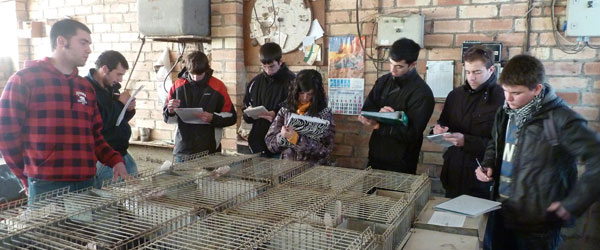
On the 6th February the second year higher-level pig farming management students visited the rabbit farm of ex-student, Marc Tatjé. He and his family have opted to sell a third of their production directly. Marc told us that they have had to make many other changes to the business, including those related to genetics, to be able to offer a distinctive product and high quality. All of us at Quintanes would like to congratulate him on bringing such innovation to the family business.
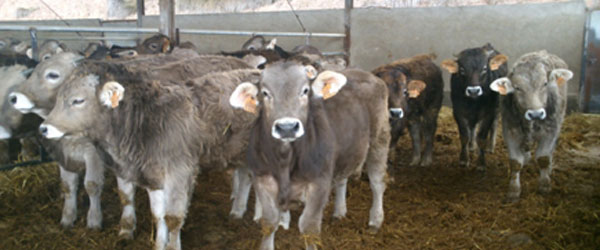
Last Friday, 1st February, the first year medium-level Livestock Production student group made a technical visit to the BIT livestock company in ´La Burgaya` (Masies de Voltregà) and ´La Vila'(Gurb). Head of the company, Mr Joan Bagaria, explained to us about the different aspects of raising and fattening calves, the on-site facilities, feeding system, health and hygiene and product commercialisation.
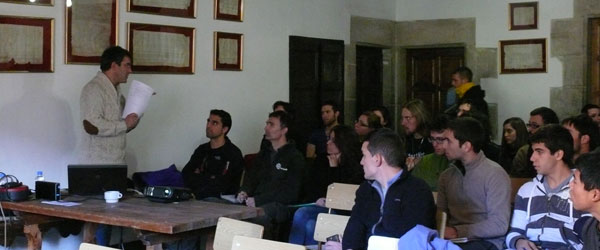
The previous 1st of February a very successful ex-gardening students meeting was organised. There was first a talk given on ´How to keep motivated working in gardening` by Mr Francesc Caballero, then this was followed by another on ´The relationship with clients in times of crisis`, given by Mrs Laia Grifell. Afterwards there was a round-table debate on these themes with all the ex-students present.
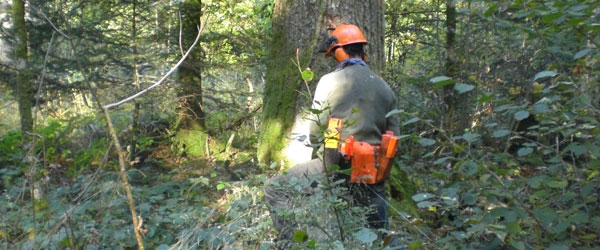
From the 4th of February onwards two training courses at Quintanes will take place: forestry technic and ecological agriculture. These courses are part of the ´Servei d'Ocupació de Catalunya` programme and take place in coordination with the ´Fundació Mil•lenari`. In the following weeks another course, that of ecological agriculture for those under 30 and unemployed, will begin. For more information please call 938866510. All courses are financed by SOC and the Social European Fund.
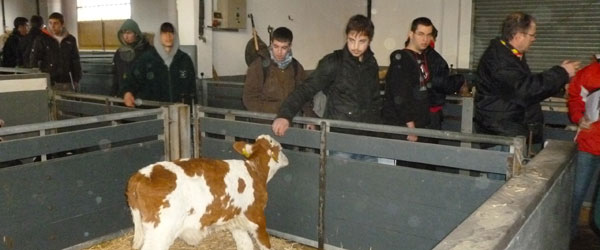
The same group made a second study visit to the facilities of the Vilarta company, where the director, Mr Lluis Vilaregut, explained the different parts of the livestock breeding business, such as; the transportation of animals, the animals' welfare, facilities, handling of the animals and product commercialisation.
The two visits helped the students learn at first-hand about the different aspects of the livestock sector.
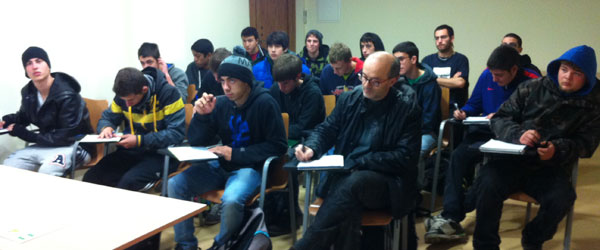
The previous 31st of January the 1st year CFGM Gardening course students visited the Parcs i Jardins de Catalunya company, responsible for the maintenance and up-keep of green areas in Rubí, as well as other towns. The company's directors explained how they managed staff and advised the students on how to go about looking for a job in the sector. Afterwards, they were shown how the company recycled vegetative waste, given the fact that it holds the ISO 9001 quality control and 14001 environmental management systems certificates.
+ info: http://www.parcsijardinscatalunya.com/
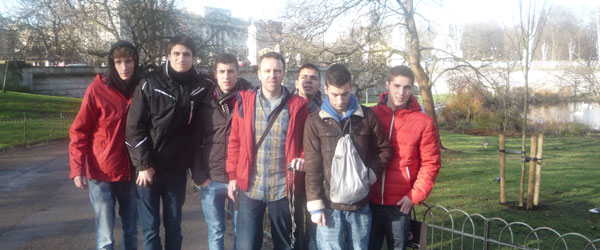
The AGS student group left for London on the 24th of January and returned on the 27th. The group was based in the centre of London and the students did two activities in pairs to practise their English. Visits were also made to Hyde Park, Regent's Park, the Natural History Museum, Camden and the changing of the guard at Buckingham Palace.